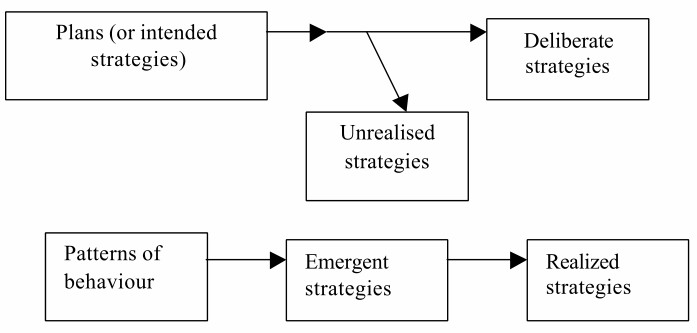The diagram below should help explain the point

- Intended strategies are plans. Those plans or aspects of plans which are actually realized are called deliberate strategies.
- Emergent strategies are those which develop out of patterns of behavior.
Example
The task of strategic management is to control and shape these emergent strategies as they develop.
BPP began life as a training company. Lecturers had to prepare course material. This offered for sale in a bookshop in the BPP building. Owing to the demand, BPP began offering its material to other colleges, in the UK and world-wide. BPP Publishing, which began as a small offshoot of BPP’s training activities, is now a leading publisher in the market for targeted study material for the examinations of several professional – dies. It is unlikely that this development was anticipated when the course material was first prepared.
No realized strategy will be wholly deliberate or wholly emergent. The line between deliberate and emergent elements within each strategy will be in part influenced by organization structure and culture.
Implicit or Explicit Strategies
Entrepreneurs often have a theory of the business, which they may or may not document.
- Implicit strategies may exist only in the chief executive’s head
- Explicit strategies are properly documented
Some plans are more explicit than others. With these in mind, Mint berg identified eight styles of strategic management
| Planned strategies | ü Precise intentions ü Explicit intentions (i.e. written down, documented) ü Imposed by central leadership |
| Entrepreneurial strategies | ü Large number of controls ü Maximizes predictability ü Intended strategy derives from the vision of strong ü leadership Not always explicit |
| Ideological strategies Umbrella strategies | ü Intended strategy is the collective vision of the ü organization’s ü Members ü Control is through shared values ü These strategies involve changing the environment |
| Process Strategies | ü Strategic targets (‘ends’) are defined and deliberate ü How they are achieved (‘means’) is emergent ü Processes are formal (e.g. hiring) and deliberate |
| Disconnected strategies | ü Content of strategies (what is done) is emergent ü Members of subunits ‘do their own thing’ ü Strategies are emergent for the whole organization, deliberate for subunits |
| Consensus strategies | ü Groups in the organization converge on common patterns of Activity |
| Imposed strategies | ü Strategy is imposed by the environment (e.g. a strong customer) which pre-empts the organization own choice |
Crafting Emergent Strategies
Managers cannot simply let emerging strategies take over. Why?
Direction: The emergent strategy may be inappropriate for the long-term direction of the organization and may have to be corrected.
Resources: It may have future implications for resource use elsewhere: in most organizations, different parts of the business compete for resources.
Managers: might wish to build on the strategy by actively devoting more resources to it.
Mintzberg uses the metaphor of crafting strategy to help understand the idea. Strategies are shaped as they develop, with managers giving help and guidance, devoting more resources to some, exploiting new opportunities and responding to developments. For example, Honda’s management reacted to the emergent strategy, eventually, and shaped its development.
Separating ‘thinking’ and ‘doing’ has the following result.
- A purely deliberate strategy prevents learning. For example it is hard with deliberate strategies to ‘learn from mistakes’, or stumble by accident into strategic growth.
- A purely emergent strategy defies control. It may in fact be a bad strategy!
Deliberate strategies introduce strategic change as a sort of quantum leap in some organizations. In this case, a firm undergoes only a few strategic changes in a short period but these are very dramatic.
The strategist must be able to recognize patterns and to manage the process by which emergent strategies are created. In other words, the strategist must be able to find strategies as well as invent them.

